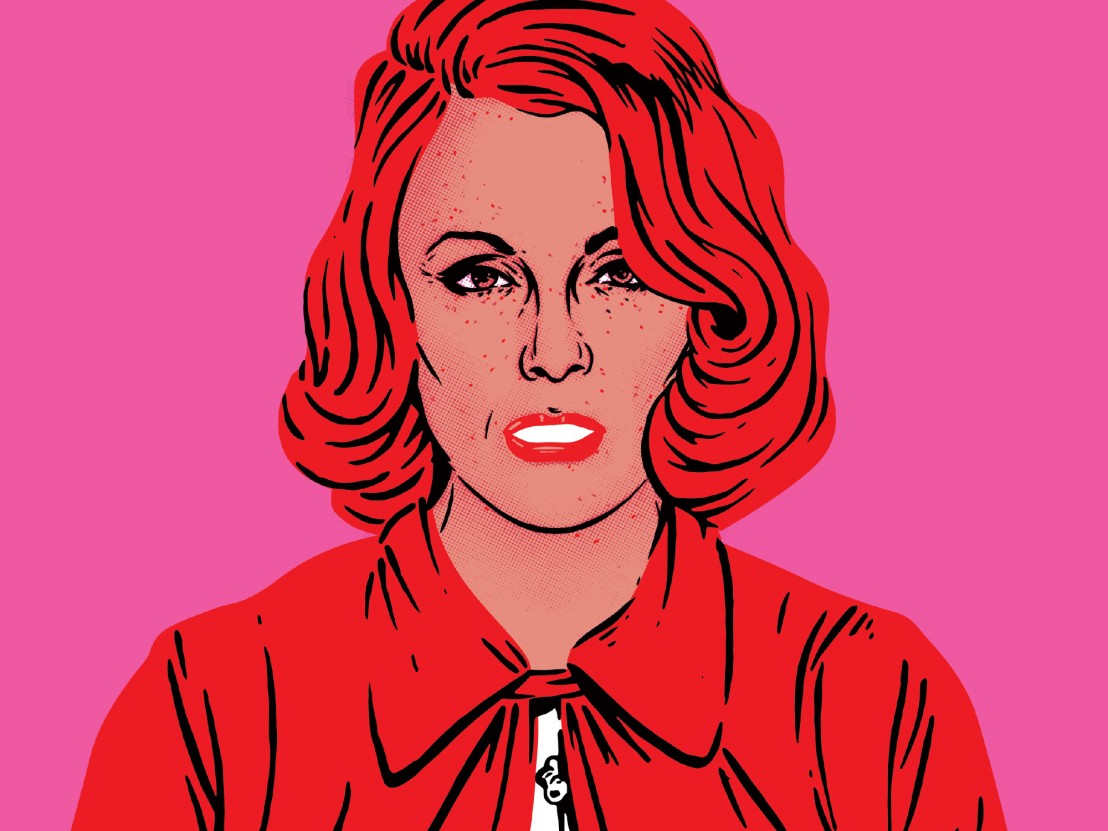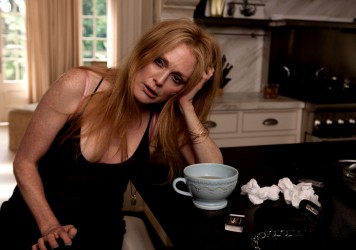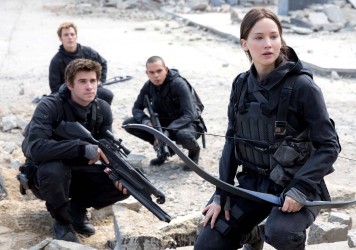
The star of David Cronenberg’s movie industry satire reveals how she’s defied the odds during her glittering career.
Top of your head, name an actress over 50. No, not Meryl Streep. Think friskier, less monolithic. Got it yet? Have a club. She’s one of only two women to have received the top acting prizes at the Cannes, Venice and Berlin film festivals (the other being Juliette Binoche). She regularly hopscotches between franchise behemoths, offbeat comedies and intimate period dramas and over the last three decades has worked with everyone from Paul Thomas Anderson and the Coen brothers to Steven Spielberg and Ridley Scott. Meet the paleontologist, pornstar, militant feminist artist, suburban housewife and C-list Hollywood Jezebel who’s got us screaming…
Here’s the thing about Julianne Moore: she might not always be the first name on everyone’s lips, but there are few more recognisable, not to mention reliable, actors working today. It’s impossible to distil her career down to a single, defining role, and equally she isn’t exactly synonymous with any particular type or character. She’s versatile, but she’s not had to change course or constantly reinvent herself in order to stay on top. So what’s the secret to her longevity? And where did it all begin for her? LWLies caught up with the shining light of David Cronenberg’s Maps to the Stars to find out.
At the turn of the decade, before the independent film explosion and before CGI technology rejuvenated the summer blockbuster, Moore was working on a “job-by-job basis”, primarily on cheap TV serials like BL Stryker, the short-lived Burt Reynolds cop drama. Theatre provided steadier footing — Moore regards a workshop theatre production of Chekhov’s ‘Uncle Vanya’ as an important formative experience. Yet for a long time, the door to Hollywood remained firmly shut. “I simply didn’t have a movie career,” Moore reflects, “I would always get close to stuff but not get it.” Then the independent film movement burst into life. In what seemed like an instant, everything changed. “Suddenly I had offers coming in from people who wanted to work with me,” she says. “I found my spot.”
Moore continues, “I went from being an actress who had a career in television to an actress who had a movie career. It was shocking. Things changed so quickly for me. It really wasn’t something I had expected at all.” No sooner had Moore’s movie career begun than she landed her big break. “I was someone who benefitted tremendously from the birth of independent film, but it was really Short Cuts that made me.” After being plucked from relative obscurity by Robert Altman, who saw enough in Moore to entrust her with one of his film’s meatiest monologues, the phone didn’t stop ringing. Eye-catching roles in Todd Haynes’ Safe and James Ivory’s Surviving Picasso followed in quick succession. And then, she met Paul.
“I was at a party and someone introduced me to this young filmmaker called Paul Thomas Anderson,” Moore recalls. “He would have only been 26 at the time, and he came up to me and was like, ‘You’re gonna be in my movie, man.’ He was lovely and super confident, and it was a gorgeous script. I said yes pretty much on the spot.” Despite Moore’s eagerness, those around her expressed some concerns about Boogie Nights. “Everyone was unsure about me doing a movie about porn,” she reveals. “A lot of people distanced themselves from it. But I never saw it as a movie about the porn industry; I saw it as a movie about this really fascinating group of people. And it was clear to me right away that I was in the hands of a great filmmaker.”
Along with Boogie Nights, it’s impossible to talk about Julianne Moore’s career in the ’90s without mentioning The Dude. Yet what’s interesting about both Boogie Nights and The Big Lebowski – two movies that are considered modern classics today – is that neither was deemed a sure thing at the time of Moore signing on. While Boogie Nights was met with widespread critical acclaim upon its release in ’97, Anderson was virtually unknown at the time, with just his 1996 debut feature, Hard Eight, under his belt.
By contrast the Coen brothers were well established when The Big Lebowski bowled into cinemas in ’98, but after the surprise success of Fargo two years earlier, it suffered from significantly raised expectations. “I remember when The Big Lebowski came out and it tanked,” Moore recalls with a hint of sustained disbelief. “The critics just didn’t get it. Everyone was saying, ‘Oh, this isn’t as funny as Fargo.’ I thought it was hysterical at the time, so I feel very gratified that it’s since turned into their biggest cult film. It was so bizarre how that happened, how it kind of became this event movie that people still flock around. But I was never in doubt. So I suppose I must have good instincts.”
“You’re going to have to refresh my memory…” Moore urges after a long, contemplative pause. LWLies has just instigated another moment of retrospection, and it’s completely thrown her. Obligingly, we reel off a few choice cuts from Moore’s back catalogue circa 2000-2010 – Far from Heaven, The Hours, Children of Men, Savage Grace, I’m Not There, Blindness, A Single Man… “Wait, did I really do that many movies?” We could have listed a dozen more. “It’s funny to think of my career in 10- year chunks,” she says. “I honestly don’t remember when I made certain movies, but there’s definitely some that feel closer than others. I can’t believe that A Single Man was the same decade as Far From Heaven. I was a completely different person then.”
It turns out the latter is one of the movies Moore does remember making, for two very good reasons. “Far From Heaven was pretty special for me because Todd [Haynes] wrote the part for me and I have a clear memory of the first time he showed me the script. And also, around the same time I found out that I was pregnant with my daughter. It couldn’t have been a better experience. Not just getting the opportunity to work with Todd again but to be with him, and then to also find out that I was expecting a girl when I already had a little boy. It was truly wonderful.”
A Douglas Sirk-inspired ’50s-set drama in which Moore plays a Connecticut housewife who finds solace in a friendship with her black gardener as her world crumbles around her, Far From Heaven marked the second of Moore’s three collaborations with Haynes, sandwiched between 1995’s Safe and 2007’s I’m Not There. It also earned her a fourth Academy Award nomination.
Interestingly, that last detail is not something Moore brings up when discussing the film. Come to think of it, she hasn’t mentioned awards or plaudits the entire interview. If she’s not preoccupied with shiny golden statuettes, then, what is it that keeps her motivated? “It’s the stories that matter,” she explains. “A lot of the movies of mine that I love now are the ones that I loved right away, from the first time I read the script. I loved them on the page.”
Another movie that holds a special place in Moore’s heart for much the same reason is A Single Man, Tom Ford’s opulent directorial debut. “I remember Tom being surprised that I was so receptive to the story,” she recalls. “He was so enthusiastic and wanted to meet me and show me all his storyboards and stuff. I was pretty much just like, ‘Okay, great. Let’s go!’ It was the story and character that attracted me, and that’s always been the case with the films I’ve loved doing. Above all, I’m interested in human dynamics, in who were are, how we treat each other and what we want.”
All of the movies listed above can be directly traced back to Moore’s career bloom in the early ’90s. But the 2000s were equally important in terms of consolidating her commercial appeal. Arriving four years after Steven Spielberg’s Jurassic Park sequel, The Lost World, 2001’s Hannibal gave Moore her second taste of working on an iconic franchise.
“Whenever I talk about my career I always find myself returning to my work with Steven and Ridley,” she says. “I learned so much from both of them. The amount of cinematic skill they have is unbelievable. The scope they can handle, how beautifully they seemed to juggle all these different complications. Working with Ridley was absolutely exhilarating for me because he’d have three cameras operating at the same time. And the same thing with Steven, he’d have you run in and cue three helicopters to fly over you. I’ve been so fortunate to have been exposed to so many different types of filmmaker.”
Maps to the Stars, the movie that looks set to define the third chapter of Moore’s career, almost didn’t happen for her. Cronenberg originally approached Moore with the part of Havana Segrand in 2009, and she admits to having been terrified about meeting the director. “I’d never met David before and I was really nervous because I thought he was going to be, I don’t know, scary or something. But he’s the most wonderful, down-to-earth person.” Having flipped for the script, Moore was left “devastated” when the financing fell through. Cronenberg turned his attention to Eastern Promises, while Moore moved on. Then, five years later, totally out of the blue, she got a phone call saying the project was back on.
Moore insists that any similarities between Havana Segrand and any real persons are purely coincidental. She does admit, however, that a little piece of herself did end up on screen. “All of Havana’s insecurities, all of her somewhat childlike behaviour, the physicality of her, is taken from everyone we’ve ever seen in the industry. Including myself! There’s definitely some of my own insecurities in there.” Moore describes playing this immensely self-involved, extremely complicated character, who is by turns grotesque and scarily real, as a “complete pleasure.” What really attracted her to the role, however, wasn’t the wild mood swings and now infamous lack of modesty, but something she identified with on a deeper personal level.
“Do you watch America’s Next Top Model?” Naturally… “Okay, so my daughter, who’s 12, and I were watching it the other day, and you know how at the end of each show they tell one of the girls that they’ve been eliminated and the girls all cry? I explained to my daughter that it’s like that for actors, too. You’re just told, ‘You didn’t get the job’, and you’re supposed to move on. It’s really upsetting. One of the moments [in Maps] I related to the most was when Havana’s agent calls her and tells her she didn’t get the job. That’s happened a million times to me. Agents always try to break it to you as delicately as possible – they’ll usually tell you not to worry and that something better will come along. The truth is, in that moment, it’s hard to believe that. Rejection can be pretty devastating that way.”
While Havana Segrand is clearly past her prime, by contrast Moore is arguably at her peak. In May she picked up the Best Actress award in Cannes, and looks set to build on that success with upcoming roles in Still Alice and The Hunger Games: Mockingjay Parts 1 & 2. You hear a lot of talk these days about how the industry doesn’t provide enough opportunities for women over 50, how older actresses just aren’t in the picture. After 22 years in the movies, is Moore simply an anomaly? She offers a different take.
“Honestly, I’ve been answering that question since I was 30 years old,” she says. “When I was first starting out in the business, people were saying, ‘Do you think there’s less opportunities for older women?’ and I was like, ‘I don’t know… am I old?” Okay, so what’s her answer to that question today? “When we talk about good roles for actors in Hollywood, whether it’s for men or women, you have to realise that the so-called business is not there to produce interesting roles for actors. Period. It’s there to create movies that will play and make money on a global scale. It’s rare within those kinds of movies to find good roles for actors. However, I do think there are plenty of movies out there that are about people – who we are and what we do – and the things that make us human. You’ve just got to know where to look.”
Published 26 Sep 2014

By Violet Lucca
David Cronenberg indulges in a grotesque inter-family orgy on the golden sidewalks of Hollywood.

Julianne Moore and Ellen Page can’t salvage this tame dramatisation of a momentous civil rights case study.

The final roll of the dice for Katniss and crew sadly doesn’t match previous instalments.